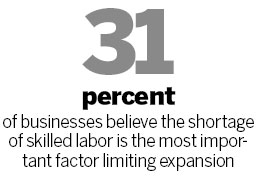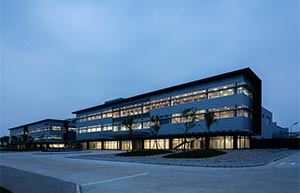


Optimism regarding economic prospects saw a significant uptick in the third quarter, according to the Grant Thornton International Business Report 2013.
Confidence among Chinese businesses was boosted by a remarkable 31 percent from 4 percent in the second quarter.
The revenue expectation over the next 12 months also rose, from 60 percent in the second quarter to 65 percent in the third, the IBR said.
"The government has unveiled a clutch of 'mini-stimulus' measures since July, which helped the economy to rebound in the third quarter and boosted businesses' confidence as a result," said Xu Hua, CEO of Grant Thornton China.
But the survey also showed that, affected by a downturn in optimism during the second quarter, many indicators remain to be restored, including expectations on profitability (42 percent), selling prices (27 percent) and exports (12 percent), all of which fell further after slumping in the second quarter.
Despite restored businesses confidence, the costs of operating a business and market competition are increasing.
IBR data revealed that 31 percent of businesses believe that the shortage of skilled workers is the most important factor in constraining businesses' expansion.
Meanwhile, despite a labor shortage, employment expectations dropped to zero in the third quarter from 9 percent in the second quarter.
The decline may be caused by the rising human cost, the report said. According to the survey, 64 percent of Chinese businesses expect to offer employees a pay raise in the next 12 months, an increase of 5 percentage points over the second quarter.
At the same time, 34 percent of Chinese businesses cited the shortage of financial options as the most important factor in constraining businesses' expansion, the highest level since 2010.
Negatively affected by the "cash crunch" in June, banks' quarter-end liquidity crunch put renewed pressure on businesses concerned about loan suspensions.
Burdened with a rising human cost and financing difficulties, Chinese businesses remain conservative in their expansion plans.
Since the year began, businesses' investments in new plants and machinery suffered a consecutive drop, down a further 27 percent in the third quarter. In line with second-quarter levels, the investment expectations in R&D and new construction in the third quarter stayed at 28 percent and 10 percent, respectively, with a marked fall from the first quarter.
Nevertheless, affected by the economic slowdown in the second quarter, businesses' confidence in market prospects is still weak, leaving most businesses cautious on further expansion.
"We believe that with a more stable economy and further reform of the financial system, businesses in China will demonstrate stronger growth momentum," Xu said.
The IBR revealed that UK business optimism shot up from 34 percent in the second quarter this year to 76 percent in the third quarter. That is the highest rise recorded for the UK in 22 years of IBR research, and makes its business community the third-most optimistic in the 45-economy survey.
Business optimism in the US remained high at 52 percent in the third quarter. The International Monetary Fund also is bullish on the US economy and expects it to drive global growth in 2014.
By comparison, businesses in emerging economies are markedly less confident. Latin America's optimism as a whole fell from 48 percent to 38 percent - its lowest level since 2009. Brazilian optimism dropped from 43 percent to 31 percent - a record low.
Elsewhere, Indian optimism (57 percent) slumped to its lowest since 2003; And Turkey (6 percent) dropped to its lowest since the financial crisis hit.
Meanwhile, South Africa fell to an all-time low at 18 percent, IBR data showed.
 Toyota TMEC opens hybrid tech R&D operations
Toyota TMEC opens hybrid tech R&D operations
 Toilet paper wedding dress to advocate low carbon lifestyle
Toilet paper wedding dress to advocate low carbon lifestyle
 Adrenalin-pumping competition on the course
Adrenalin-pumping competition on the course
 High-octane weekend of motorsport
High-octane weekend of motorsport
 3D light show displayed in Shanghai
3D light show displayed in Shanghai
 Lenovo moves up the ranks
Lenovo moves up the ranks
 Fuding savors success in white tea
Fuding savors success in white tea
 Is it still Halloween?
Is it still Halloween?